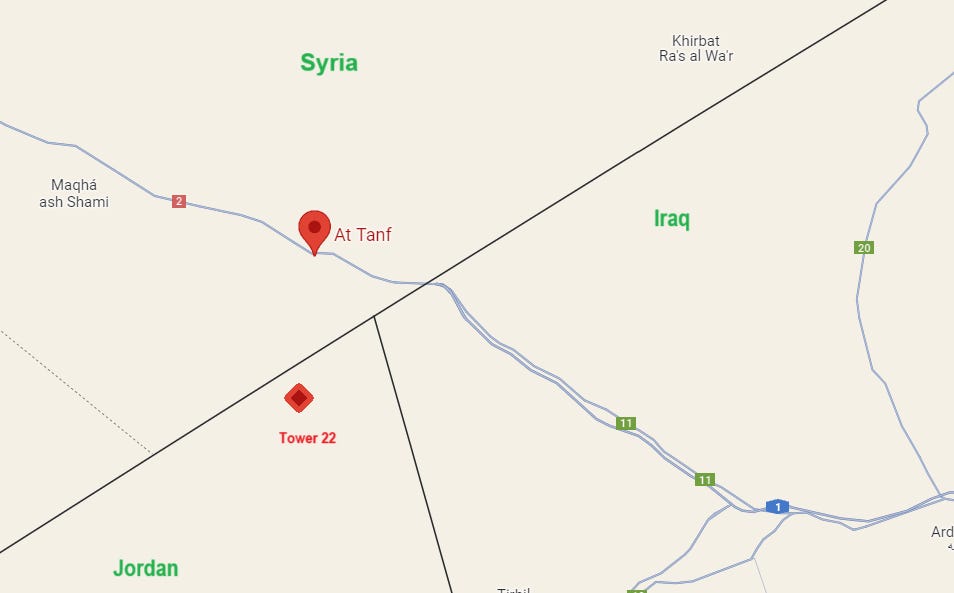The Attack On Tower 22.
Note: I’m writing this for a general audience at various levels of familiarity with the Middle East. There’s going to be a lot of simplification, and so apologies to all the IR / CT wonks in advance.
In the most recent issue of Business Thoughts, I’d written, of western countries’ response to the Red Sea conflict, itself as extension of the Gaza conflict, the following:
This’ll be ongoing, low-intensity, and indulgent of Iran’s fig leaf that it’s not truly the one behind the entire mess currently engulfing the Middle East.
But if there’s anything that’s true of writing about the geopolitics of the Middle East, it’s that it’s very often a humbling experience. And in this instance, I may have to eat those very words quoted above.
Three days ago, on 28 January 2024, an unmanned “suicide drone” attacked a US base in Jordan, killing 3 servicemembers and wounding 40. The attacked base is called “Tower 22,” and is a small installation in the tri-border region of Jordan, Syria and Iraq. Tower 22 is part of a network of US installations in the region (both in Jordan and elsewhere) which exist, at least primarily, for the purpose of combating the ongoing threat posed by ISIS.
So, whodunit? If you’re thinking Iran, you’re right…sort of. The DOD’s confirmed that it’s an Iran-backed militia, and they suspect, at this point, that it’s Kata’ib Hezbollah (referred to commonly as “KH”). But who are these guys?
From the outset, it’s important to distinguish KH from what we commonly know as Hezbollah. Hezbollah was formed in Lebanon in the 1980s in the wake of the 1982 Lebanon War, and is primarily concerned with the affairs of Lebanon / the conflict in southern Lebanon vs. Israel. KH, on the other hand, is a much newer organization, founded in 2003 in Iraq after the US invasion. Their goal is the creation of an Iran-aligned Iraq, and to this end, they’ve actually fought against ISIS. This hardly paints them in any sort of favorable light, however, as their actions during the Iraqi insurgency, from roughly 2007 onwards, led to a number of US, coalition and civilian casualties. However, the one incident that sticks out—at least in my mind—wasn’t casualty-related at all, but was rather the hacking of unencrypted video feeds of US Predator drones above Iraq, back in late 2009.1
Anyway, so, this was likely KH, and was definitely Iran-sponsored, and we’re now left with the gaping question of why? Getting to the bottom of that is going to be tough to do succinctly, but I’ll try.
So, Syria has been in a state of civil war since early 2011, when protests against the government of Bashar Al-Assad hit a boiling point. Assad had been a thorn in the side of the US, other western countries, and their GCC allies for a while at that point, and so these nations supported the newly formed rebel forces such as the Free Syrian Army. Assad wasn’t without international support either, though, and the Syrian government received military and other aid from Iran and Russia (the latter, quite significantly) to help crush the rebellion. Without going too far into it, what I’m trying to convey here is that Syria was (and still is) chaos. And chaos is fertile ground for terrorists.
While all that was going on, in 2014, ISIS made great strides in seizing and holding territory, mostly in eastern Syria and western Iraq. The US government, of course, wouldn’t stand for that, and so it launched an aerial bombing campaign against ISIS as part of CJTF-OIR, or what we’ll refer to as “Operation Inherent Resolve.” Operation Inherent Resolve continues through today, as ISIS also continues to pose a regional threat. Vital to Operation Inherent Resolve are various military installations in the tri-border region, including (perhaps most importantly) Al-Tanf, which is inside Syria. Now, bases located inside hostile countries / warzones need to be supplied, and ideally from installations that are not in warzones and in places that are allied to the US. One such is Tower 22, within the borders of US-allied Jordan. Are things starting to make a bit more sense? Just wait.2

Starting in the fall of 2023, in the wake of the Hamas attack on Israel and the ensuing Gaza conflict, US forces in the tri-border region have come under repeated attacks from Iran-backed militias, including, prominently, KH. The recent attack, while a big news item at present, is really just the latest in a string of incidents, some more successful for their perpetrators than others. The deaths of 3 US servicemembers certainly adds to the pressure on the US government to take decisive action against Iran, but it’s not as though this pressure is new, or of a sudden onset.
It’s also easy to get muddled here. Given the timing (i.e., coming relatively shortly after the Houthi attack on merchant and US naval assets in the Red Sea), the tactics deployed (i.e., unmanned “suicide drone” strike) and the underlying state sponsor (i.e., Iran), it’s easy to connect dots to indicate a clear escalation by Iran that would warrant escalation in response by the US. Accurate analysis here I think requires a lot of information to which the general public doesn’t have access (e.g., intercepts, intelligence work product, etc.), and it’s tough to say whether the latest attack was something of a fluke success or a step-up in capabilities / tactics / strategy, etc. It’s likely all-hands at the DIA—and the wider US & Coalition intelligence community—until all that gets figured out.
So, what next? Do we just rip off the Band-Aid and enter into open conflict with Iran? Probably not. For one, as Jason Lyons points out on this episode of The Team House podcast, the *one* country that has a history of going into Iran and getting stuff done, Israel, is a little tied up with something else at the moment. I’m not sure what the Israeli appetite is for a conflict in Iran at the moment, given the ongoing conflict in Gaza, but I doubt Israel will forget anytime soon that it was Iran behind the Hamas attack on October 7th, 2023. I do wonder if Israel being tied up in Gaza factored into the Iranian calculus in supporting the attacks in the Red Sea, the tri-border region, etc. at this point in time, and I suspect the answer is yes. However, on the other hand, the US certainly doesn’t need Israeli support to escalate against Iran, and so Israel’s potential unavailability at the moment isn’t really dispositive of anything.
Concerning a different US ally in the region, my first take upon hearing of the incident—recited only to my wife while driving through a snowstorm—was about how this would affect relationship dynamics between the US and Jordan. With the at least overt responsibility of providing security for US forces operating on its soil, Jordan has likely found itself in the hot seat. Initially adopting the “Shaggy Defense,” an official government spokesperson tried to claim that the fatal attack on US troops took place in Syria, and not inside Jordan. Once details emerged and maps got circulated, the Jordanians had to walk that one back. Now, Jordan has been a long-time ally of the United States in the region, but it’s not hard to imagine that Jordan, for its own interests, is wary of outright war with Iran. Furthermore, the Jordanian government has recently been vocal in asking the US to increase its anti-missile security posture within the country, specifically requesting the deployment of Patriot air defense systems. So, maybe the pressure cuts both ways here.
When asked whether the US would respond, President Biden has indicated “yes,” without providing any further details. So, for right now, it’s just a matter of waiting and seeing.
Ed. Note: Just after the above was written, the White House made a formal announcement that attributed the attack to an umbrella organization, the “Islamic Resistance in Iraq,” which includes KH, among other groups. Over recent months, KH has been behind some strikes against US forces in the regions, and other groups have been behind other strikes. My take: attributing it to the umbrella rather than specifically to one constituent group yields more latitude for retaliatory actions.

